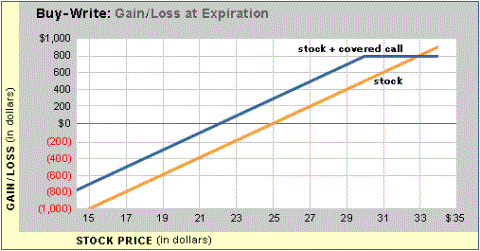
Of the kinds of multi-legged orders that can be placed ‘as a package’ using this feature, buy-writes and unwinds are unique in that one leg of the trade is for an option, the other is for an equity. Because one leg trades on an option exchange and the equity leg on a separate, equity exchange, the circumstances in which the ‘Net’ price indication will be better than the prices for the separate legs combined will be uncommon. (Please note the indicative prices are not firm quotes and may not be available when an order is sent for execution.)
In a Buy/Write, the individual purchases a stock and simultaneously writes calls against it. If the call expires out of the money, the investor will have collected the premium of the option – he is effectively generating income against his long position. Additionally, the investor will participate in any rise in the security up to the strike price of the option. If the option expires in-the-money, it will be exercised and the investor will have to sell his shares at the given strike price. On the downside, the underlying security has to fall further than the collected premium before money is lost, so the written call also gives a limited amount of downside protection.
This strategy is different from covered call writing only in that the investor does not own the security prior to selling the option contracts.
For use when investor anticipates:
Financial Characteristics:
Objectives:
EXAMPLE (Buy-Write)
Currently, XYZ trades at $25/share. An investor would like to participate in some of the upward movement in the stock and to generate additional income at the same time. Using the Buy-Write strategy, the investor buys the stock (100 shares) and sells one out-of-the-money call ($30 strike price) for $3.00 per share, for a total cash credit of $300.00. If the stock appreciates past $30.00/share, the total gain is capped at $800.00. The stock must fall below $22 (the breakeven price) before the investor loses money, so the short call provides limited downside protection.

Unwind is the term used to refer to the order that closes out the positions opened in a buy-write strategy. The unwind for the example in buy-writes above would be to sell XYZ and to ‘buy to close’ the $30 short call. Unwinds should be viewed more as a closing transaction than as a true option trading strategy.
Commissions, taxes, and transaction costs are not included in any of these strategy discussions, but can affect final outcome and should be considered. Please contact a tax advisor to discuss the tax implications of these strategies. Many of the strategies described herein require the use of a margin account. With long options, investors may lose 100% of funds invested. In-the-money long puts need to be closed out prior to expiration, since exercising them could create short stock positions.
Options carry a high level of risk and are not suitable for all investors. Certain requirements must be met to trade options through Schwab. Multiple leg options strategies will involve multiple commissions. Please read the options disclosure document titled "Characteristics and Risks of Standardized Options." Member SIPC
Copyright ©Charles Schwab & Co., Inc. 2005-2014. All rights reserved. Member SIPC. (0814-5339)